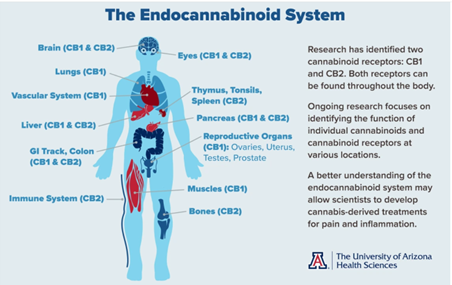Graduate Student Receives Major NIH Grant to Study Cannabis and Brain Health in HIV
We're excited to share that Kellen McDonald, a graduate student in the DICoN Lab, recently received a prestigious F31 fellowship grant from the National Institute on Drug Abuse, a branch of the National Institute of Health (NIH). Her project, called "Impact of HIV and Cannabis Use on Executive Brain Function and Inflammation," will study how cannabis might reduce brain inflammation in people with HIV. She'll focus on how cannabis—a commonly used substance—affects brain inflammation and executive function abilities.
Filling the Gap
Major improvements in HIV treatment have changed what it means to live with HIV. Thanks to powerful medications, people with the virus can now live longer, healthier lives. But important challenges still exist. Many people with HIV experience ongoing decline of executive function skills, which only gets worse over time.
Executive Dysfunction
Executive dysfunction refers to the difficulty in cognitive processes we use for goal-oriented behavior, such as planning and focus, as well as the process of making decisions. Symptoms can include:
Difficulty managing time
Trouble deciding what tasks are most important
Challenges starting and finishing projects
Problems controlling emotions and impulses
Individuals may also have issues with paying attention, working memory, and adapting to changing situations (Rabinovici et al., 2015).
Cannabis May Help Protect the Brain
Many people with HIV already use cannabis to help with symptoms like nausea, pain, and other HIV-related discomforts. But emerging research suggests cannabis might offer benefits beyond symptom relief—it could actually help protect the brain (Christopher-Hayes et al., 2021; Schantell et al., 2022; Schantell et al., 2025).
HIV can cause ongoing inflammation in the brain, termed neuroinflammation. Scientists think this inflammation contributes to HIV-related cognitive dysfunction. Meanwhile, cannabis has been shown to have anti-inflammatory properties. It works by affecting special receptors in the body's natural system that help control immune responses within the endocannabinoid system.
Recent studies show that cannabis may have a normalizing effect on behavior and brain function related to executive processes in people with HIV. For example, people with HIV who use cannabis show brain activity patterns that are more similar to those of healthy controls in key brain areas (Christopher-Hayes et al., 2021; Crook et al., 2021; Schantell et al., 2022; Schantell et al., 2025).
While these early findings look promising, there are still gaps in our understanding. We're missing information about how cannabis affects the relationship between neuroinflammation and neural activity underlying executive function in people with HIV. That's where Ms. McDonald's research comes in. She and her colleagues will look at all three pieces of the puzzle together: cannabis use, inflammation, and brain activity that supports cognitive performance.
Research Approach
This fellowship will help fill that knowledge gap using state-of-the-art brain imaging technology called magnetoencephalography (MEG). MEG is a powerful neuroimaging machine that helps scientists detect brain activity with incredible precision—both in terms of location and timing. Ms. McDonald and her colleagues will combine this advanced brain imaging with two other key measurements:
Cognitive testing to check how well executive function is working
Blood collection to measure levels of inflammation
By bringing together these three different types of measurements, the research team hopes to get a comprehensive view of how cannabis might be affecting brain health in people with HIV.
Why This Research Matters
Cognitive difficulties are common among people living with HIV, negatively impacting their daily lives, and cannabis is already widely used in this community. Because of this, it's important that we understand these connections. If cannabis does help reduce neuroinflammation and protect thinking skills, this information could help people with HIV and their doctors make better decisions about treatment options.
This research represents an important step toward understanding how we can better protect cognitive abilities as part of complete HIV care. It could potentially improve the quality of life for millions of people worldwide.
F31 Grant Award
The Ruth L. Kirschstein National Research Service Award (NRSA) Individual Predoctoral Fellowship, more commonly referred to as an F31 fellowship, is provided by the NIH. It is an extremely competitive individual fellowship for Ph.D. students in biomedical, behavioral, and clinical sciences. The purpose of the grant is to enable promising predoctoral students to receive individualized, mentored research training and financial support while conducting their dissertation research.
Sources
Christopher-Hayes, N. J., Lew, B. J., Wiesman, A. I., Schantell, M., O'Neill, J., May, P. E., Swindells, S., & Wilson, T. W. (2021). Cannabis use impacts pre-stimulus neural activity in the visual cortices of people with HIV. Human Brain Mapping, 42(16), 5446–5457. https://doi.org/10.1002/hbm.25634
Crook CL, Savin MJ, Byrd D, et al. The neurocognitive effects of a past cannabis use disorder in a diverse sample of people living with HIV. AIDS Care. 2021;33(11):1482-1491. doi:10.1080/09540121.2020.1822504
Rabinovici, G. D., Stephens, M. L., & Possin, K. L. (2015). Executive dysfunction. Continuum: Lifelong Learning in Neurology, 21(3, Behavioral Neurology and Neuropsychiatry), 646–659. https://doi.org/10.1212/01.CON.0000466658.05156.54
Schantell, M., Springer, S. D., Arif, Y., Sandal, M. E., Willett, M. P., Johnson, H. J., Okelberry, H. J., O'Neill, J. L., May, P. E., Bares, S. H., & Wilson, T. W. (2022). Regular cannabis use modulates the impact of HIV on the neural dynamics serving cognitive control. Journal of Psychopharmacology, 36(12), 1324–1337. https://doi.org/10.1177/02698811221138934
Schantell, M., Lulli, M. C., McDonald, K. M., Horne, L. K., John, J. A., Coutant, A. T., Okelberry, H. J., Glesinger, R., Arif, Y., O'Neill, J. L., Bares, S. H., May-Weeks, P. E., & Wilson, T. W. (2025). Cannabis- and HIV-related perturbations to the cortical gamma dynamics supporting inhibitory processing. Brain Communications, 7(3), fcaf190. https://doi.org/10.1093/braincomms/fcaf190


